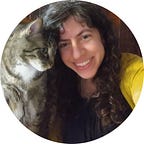What’s in a Name? Lessons from a Refugee Camp
“Is this what you expected?” Anna asked me on my first day volunteering at the refugee camp.
“Yes,” I told her. A month of research before I left for Greece had well-prepared me for what I found upon arrival: rows of blister white aptly named “containers”, temporary dwellings that some had inhabited for three years; Farsi, Arabic, and Kurdish filling up the air with their exquisite but to my ears incomprehensible sounds; children who approached without caution; women’s eyes that would not meet mine: I was expecting it all.
But by my last day at the camp, I’d changed my answer to Anna’s question. By then, the containers had become homes and I’d been invited into many of them. I understood what the cacophony of sounds around me meant: We will not be silenced. Most of all, Nasrin, Alicia, and Ibrahim had crossed paths with mine, and I could never have predicted their words nor their effect on me.
Nasrin offered me eight apologies on my last night in the camp: one for each dish she served. “Sorry. I wish give you more.” Our meal followed an afternoon of belly dancing with her friends, music blasting from her home at a volume that would’ve put nightclubs on edge. Via gestures and Google translate, we chatted about their children, relationships, and sex. Our laughter almost drowned out the music and I almost forgot where I was.
Our feast began after Nasrin’s friends left. Her three-year-old son Bahar’s abuse of her seven-year-old daughter Raha began while steam was still curling its way up from the rice. Giggles shook Nasrin’s body as Bahar poured a cup of water on his sister. At first frozen, the cup of soda that came next thawed Raha’s body. Her shoulders met her ears, her mouth twisted open, a stream of tears cut a trail through the dust on her face. A wail shredded Raha’s silence to pieces when Bahar grabbed a chunk of her hair and wrenched it towards him.
“Joke,” Nasrin told me laughing as I pried her son’s hand from her daughter’s hair, long black strands between his fingers.
“It’s art,” was a volunteer named Alicia’s response to a question I’d asked her at the end of a women-only afternoon in a park. The distinction between “refugee” and “volunteer” made no difference to the sun and mosquitoes which burned and bit all twenty-five of us equally. We’d covered the grass with narrow scarves that left us sitting close. The sharing of dreams brought us closer still. While one woman spoke about her studies and work before the war, her several-week old infant’s cries ceased in Alicia’s embrace.
On our journey back to the camp, Alicia waxed poetic about bullfighting.
“How can you hold a child with such gentleness and at the same time cheer as an animal dies a brutal death?”
“It’s not brutal,” she told me. “It’s art.”
Ibrahim, a survivor of torture, had arrived at the camp a shell of a human being, skin gray, unable able to stand upright, his soul all but beaten out of his body. One year later, he sat in an English classroom and listened, speechless, to a ten-minute class discussion in which other refugees extracted grief from their hearts, chronicling the injustices they had suffered in Greece.
Then, in a voice the size of a tear falling from the heavens, Ibrahim spoke.
“I was wealthy in my country. I hated refugees. I called them criminals. I thought they were destroying Syria. Now…I am a refugee.”
That tender hearts can rename cruelty as “joke” and “art” with nonchalance and conviction unnerved me. Ibrahim’s words challenged me. I left the camp wondering: What injustices have I justified? What brutality do I call by another name?
